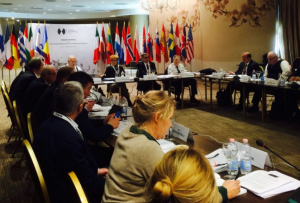NEWS Italy Will Take on the Presidency of the International Holocaust Remembrance Alliance
It Is now official: Italy will take on the presidency of the International Holocaust Remembrance Alliance (IHRA) in 2018. As explained by the head of the Italian delegation, Ambassador Sandro De Bernardin, “It is undoubtedly an important recognition for the work Italy has done in recent years, and of how much what we’ve been doing is appreciated. It is not easy to manage the presidency, and I take this confirmation as a gesture of confidence in our work, and as an important responsibility.”. The program for 2018 is not totally defined yet – the Italian delegation is working on it in agreement with the Ministry of Education, that is competent on IHRA in our country – and it will take another few weeks to get a clear picture.
However, what is already certain is that there will be two plenary meetings organized in Italy in 2018, and one of them will surely be in Rome: “Although we are still in a phase of reflection, I can anticipate that the focus of our work will be, as it is natural, a continuation of our engagement on the educational front, which is one of the pillars of IHRA’s work in Italy, and we will definitely mark the anniversary of the promulgation of the racial laws of 1938. It is a recurrence of great symbolic value and I find it very important that it will be underlined by the Italian presidency of IHRA.”
Besides the announcement of the Italian Presidency – Italy comes after the Hungary in 2015, Romania for the current year and Switzerland that will take over the coordination in March of 2017 – Ambassador De Bernardin recalls the major topics discussed at the plenary meeting just closed in Iasi, Romania: “We have received confirmation that the use of moral suasion works: IHRA delegations are composed of diplomats, experts, people who are both from the world of non-governmental organizations and from the institutional world, and the work is shared on all fronts. But in the end it’s the diplomats who have to make the best possible use of all the input and proposals they receive. And it works”.
A recent example is the result obtained with the Czech Republic, within the monitoring program of sites devoted to Memory: after a dispute on the fact that in Lety a pig farm was built in a place of extermination, through pressure on the diplomatic channels, the government has proceeded to the purchase of the land and guaranteed that it will take care of the reconversion of the site.
There is also a constant monitoring of the work done by member countries, which in turn undergo an evaluation, accompanied in that path of two other delegations, to get a better understanding every country’s strengths and weaknesses. “It is an important and interesting process, which has brought the quality of debate at a very high level: after answering to a specific questionnaire the two accompanying countries send the first observations, then everything is reviewed and later debated in the plenary meeting. This time there has been a specific demonstration of how much IHRA’s pressure has led to improve the situation. This type of monitoring in my opinion is especially needed for Eastern European countries, which have a long way to go. And the trend is definitely positive.”
Many discussions have been carried on in the working groups dedicated to academic projects, with particular attention to historical research, and the continuation of the debate centered on the need – or not – to systematically emphasize the uniqueness of the Shoah. There are two traditional options: to emphasize its uniqueness, or the underline a sensitivity to other forms of genocide, as a sort of sense of responsibility that leads to emphasize the similarity with other situations, with the express purpose of making the Shoah an antidote to the recurrence of similar events.
Ambassador De Bernardin has explained that there has not been a conclusion – it should be remembered that the IHRA works only by consensus – but the debate has been extremely interesting and profitable. The attention of the plenary was then brought on the need to guarantee freedom of historical research, an increasingly complex and important issue which in some countries needs support. And even in this kind of situations the channels of diplomacy and IHRA network are active and ready to step in wherever needed, to ensure such a fundamental respect for freedom, showing how it is possible to arrive at important results without creating contentious cases that might end up in even greater difficulties.

